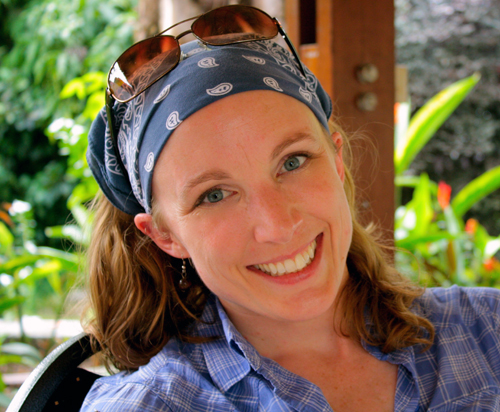
Nikki Whaites was focused on a career in communications until she was sent by the Vancouver magazine she was working for to fly to Alexandria, Egypt, on assignment. “I was covering the Global Youth Employment Summit there,” she says. “It was my first time seeing what communications meant in a global sense, and it really changed what I wanted to do with my life.”
Today, Whaites serves as deputy director of international programs for War Child, providing support to those offering programs in communities where war and conflicts have created serious problems for children. “I work with program teams here in Toronto and with the country directors,” she explains.
Instead of reporting on the news, she’s right in the middle of it.
War Child works in six countries, offering programs for education, livelihood and justice, all through a child-focused lens. “The programs are different in each country, depending on the needs,” she says. “For example, we are a registered law firm in Uganda working with women and girls to increase their access to justice both informal and formal. All of the offices are staffed by local people with, at times, the exception of the country directors.”
Whaites’s shift in career focus was facilitated by enrolling in U of G’s School of Environmental Design and Rural Development. “It was the only master’s program that I could find that had the flexibility and avenues for the areas I wanted to research,” she says. “I had originally hoped to study a women’s radio station in Afghanistan, but the situation had deteriorated there after I enrolled in the program. I ended up going to Ghana and looking at rural radio stations in that country and how the different types were involving communities in programming decisions.”
Even before completing her thesis, Whaites was hired by Journalists for Human Rights. “When I started there, we were in five countries, and by the time I left we were in more than 12. This organization looks at media and journalism as a way of rebuilding nations. In any coup, one of the first things they do is take over the three M’s: money, military and media – that shows how powerful the media is. Journalists need to know how important their role is in helping countries through and after conflict.”
Whaites left that position to do some freelance work, primarily working on neglected tropical diseases such as leprosy. “At any given time, this group of diseases affects about one billion people globally,” she says. Then she was hired by War Child almost three years ago.
Her current job requires significant travel and quick response to constantly-changing conditions. “For example, I was just recently in South Sudan looking at the recent conflict there and how we can help to meet the needs of children. War Child has been involved in that country since 2012, but the recent conflict means many of the people we were working with are now in internally-displaced person camps. So now we are doing programming within the camps,” she says.
But it was difficult. War Child’s plan had been to work in one of the camps and conduct an assessment in another to see how the organization might help. Overnight, conflicts broke out at the location of the second camp and everyone fled. Throughout the conflict, flights were suspended, and the people in control of the airports changed several times. Despite the challenges and risks, “it is really important for War Child to be there,” says Whaites. “The local people tell us about their homes being looted and how they escaped from armed troops. Yet they are very dedicated to keeping the programs going.”
War Child is expanding into Jordan this year, working with Syrian refugees. The organization is also monitoring the situation of children in the Central African Republic, where 98 per cent of children are not attending school because of the situation there. “It will be important to help them catch up,” says Whaites.
“The most rewarding part is seeing the benefits of the work we do,” she adds. In Darfur, for example, the school where War Child provided textbooks and other programming reported excellent exam results a year later – they were ranked first in the area and eighth in the district.
In Afghanistan, they worked with women who had no education and could not read or count, and taught them these basics as well as business skills. “By the end, they were all running their own businesses – some had four or five! They made significant contributions to the family income. One woman said, ‘Of course we can go to the market by ourselves. We are just like men – it doesn’t matter that we don’t have beards.’”
Whaites adds: “For every horrible news story, there are also incredible stories of resilience. I am proud to be part of War Child and the work we are doing.” To learn more about the organization or to donate, visit www.warchild.ca.